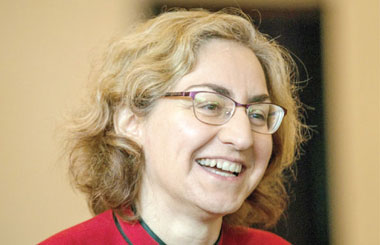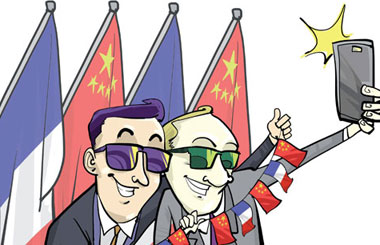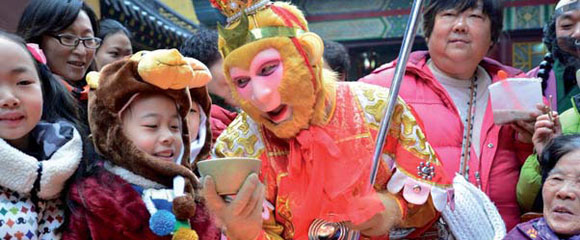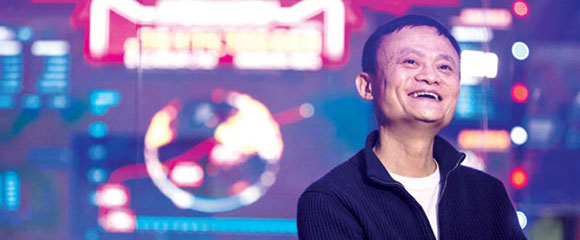Famous rebel with the golden gaze
Updated: 2016-02-05 08:06
By Raymond Zhou(China Daily Europe)
|
|||||||||||
|
|
There is no better embodiment of the power and appeal of 2016's zodiac animal than Sun Wukong, also known as the Monkey King.
The protagonist in China's greatest fantasy novel, Sun was born out of a magic stone that sat atop a mountain and gathered the powers of heaven and earth since time immemorial.
In real life, Wu Cheng'en's creation in Journey to the West may have been inspired by the Hindu deity of Hanuman from the Ramayana, who is a monkey, or vanara, who took part in a war against a demon king, or by Shi Banto, the first disciple of the Tang Dynasty (AD 618-907) monk Xuanzang, or a fusion of these and various Chinese folklores.
The stone monkey projected two beams of golden light, startling the Jade Emperor. The emperor ordered two officers to investigate. They were Thousand Mile Eye and Wind Accompanying Ear, two of the numerous characters that have since found their way into everyday Chinese idioms.
The novel is such a towering achievement in imagination that any lament about the lack of creativity in contemporary Chinese literature in this genre is invariably contrasted with the mention of this epic novel that contains a wealth of characters and details measuring up to the best in the world, past and present.
The Monkey King has a base where he is the leader to many of his kind, but without supernatural powers. The Mountain of Flowers and Fruit is akin to a utopia for schoolboys - all fun and little discipline. Sun formed alliances with a variety of dubiously named forces, such as the Bull Demon King, but was never morally corrupted by the association. What rattled Heaven was his refusal to reincarnate like other living beings. He simply erased his name - and those of other monkeys - from the Book of Life and Death. In other words, he stares down at even the most basic principle of mortality.
The way Jade Emperor treated Sun is an apt reminder of how Chinese politics has played out throughout history. Sun wanted to elevate his status to that comparable with the gods, but the emperor assigned him to the stable, convincing him it was a very important job. In fact it was the lowest in Heaven's hierarchy. Discovering the truth, Sun proclaimed himself Great Sage Equal of Heaven and set The Cloud Horses free.
Sun was given another position, this time as guardian of the Heavenly Garden. But the insignificance dawned on him when he was excluded from a royal banquet. So he took matters into his own hands: He consumed "the peaches of immortality" and "the pills of longevity"; he drank up the emperor's royal wine and he fled to his own base preparing for a rebellion.
The episode "Havoc in the Heavenly Kingdom", in which Sun single-handedly defeats a 100,000 strong army of celestial warriors, is often read as a parable of revolutionary awakening. Sun intended to function inside the establishment, but he was relegated to positions of nominal importance. When he realized that he would forever be treated as an outsider, he embarked on a road of no return - revolution.
Along the way, he gained potency. For example, he was burned for 49 days in a cauldron. While mere mortals would long have turned to ashes, Sun reemerged stronger than ever, having burnished his eyes to the point when he could instantly recognize evil in any shape or form. Hence "the golden gaze of fiery eyes". No wonder people like Mao Zedong revered him as the ultimate rebel.
The paradigm of revolution may not fit neatly into the bulk of the novel, which is a chapter by chapter account of the titular "journey to the west". "West" in this case is India, home to Buddhism, where Sun escorts Xuanzang to fetch Buddhist sutras. The monkey is paired with Pigsy, a Falstaffian comic foil, and a less colorful character named Sandy (not the English name, but a short form of Monk of Sand). Xuanzang is based on a real life monk who indeed took the legendary pilgrimage, but the fictional version is portrayed as a naive, smooth-bodied man whose flesh is a potion for immortality.
His kindheartedness and credulity subjected him to countless perils, especially demons out to devour his body. (I'm not sure about any Freudian connotation here.)
Anyway, against such a feeble master, the Monkey emerged the true hero with not only loyalty but a bevy of supernatural skills that defeated foes in any shape or form. He could conduct 72 transformations himself, which puts him on a par with the best superheroes out there.
Since this is a Buddhist tale, the monkey's skills, no matter how fabulous, would be tamed by Buddha. In fact, the unsavory part of his legacy evolved from the Monkey's showmanship in front of Buddha. To prove his flying skills, Sun leapt off and flew to the end of the world as la Superman. There he found five giant pillars and nothing else. To mark his visit, he carved his name on one of the pillars and urinated at its base.
Upon his return, Buddha showed him that he had never departed from Buddha's palm. The five pillars are the Buddha's five fingers. Some Chinese tourists, despite relentless discouragement, including the threat of fines, cannot resist the urge to imitate the monkey by carving their names on the stones of the Great Wall and other cultural relics.
The original novel, also translated as The Monkey King or simply Monkey, has spawned numerous adaptations. Rarely does a year go by without a new film or television retelling, often a single episode in the long journey, making its debut on the screen. In the old days, ordinary Chinese relied on various opera versions for the same purpose, which more or less shaped the visual image of the beloved primate.
Chinese culture has no shortage of rebels. The Outlaws on the Marsh, another of the four classic novels, has 108 of them, all with distinct names, back stories and personalities.
But the Monkey King is in a league of his own. He exudes a boyish playfulness that makes his rebelliousness more palatable to the public - and to the authorities.
Within the confines of the Buddhist order, he stretches his nonconformity to the maximum, where he is forever enduring as well as endearing. That is quite a feat, even for someone who can cover 33,000 miles in one leap.
Related Stories
Injured 'monkey king' back in the wild after rescue 2016-02-04 17:54
Will the monkey play havoc with China's tech gurus? 2016-02-04 10:18
Foreign brands look to profit from the monkey 2016-02-03 08:16
Online community fears for monkey king ahead of Year of the Monkey 2016-02-01 15:08
Today's Top News
Russian PM warns against 'new cold war' at MSC
Einstein's gravitational waves detected
As Chinese celebrate, rest of world benefits
UK's Pinewood film studios eyes China expansion
'China's continuous growth benefits UK and the world'
China detects first imported case of Zika virus
Cameron expects even better ties with China
Eight dead in train crash in Germany
Hot Topics
Lunar probe , China growth forecasts, Emission rules get tougher, China seen through 'colored lens', International board,
Editor's Picks

|

|

|

|

|

|







